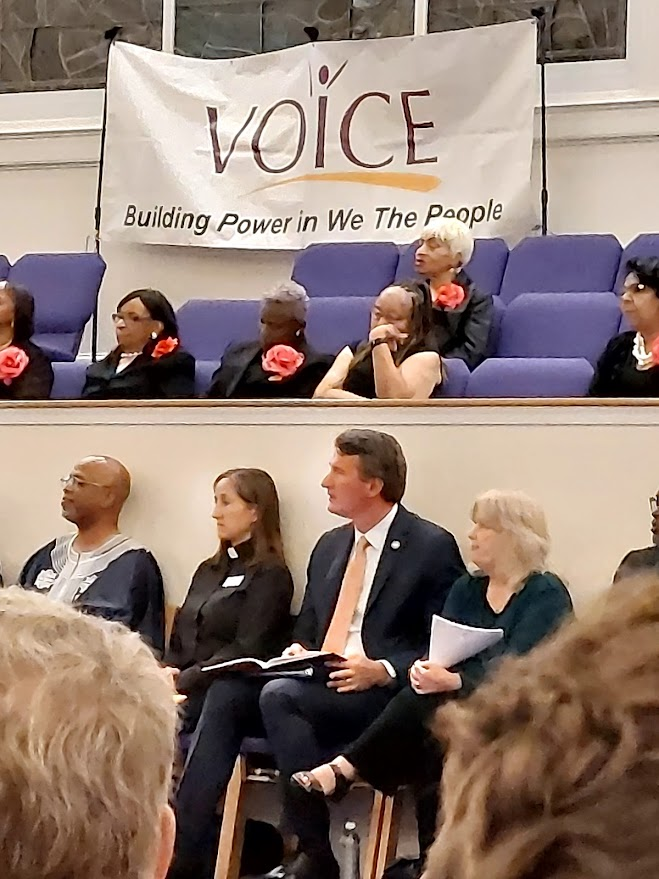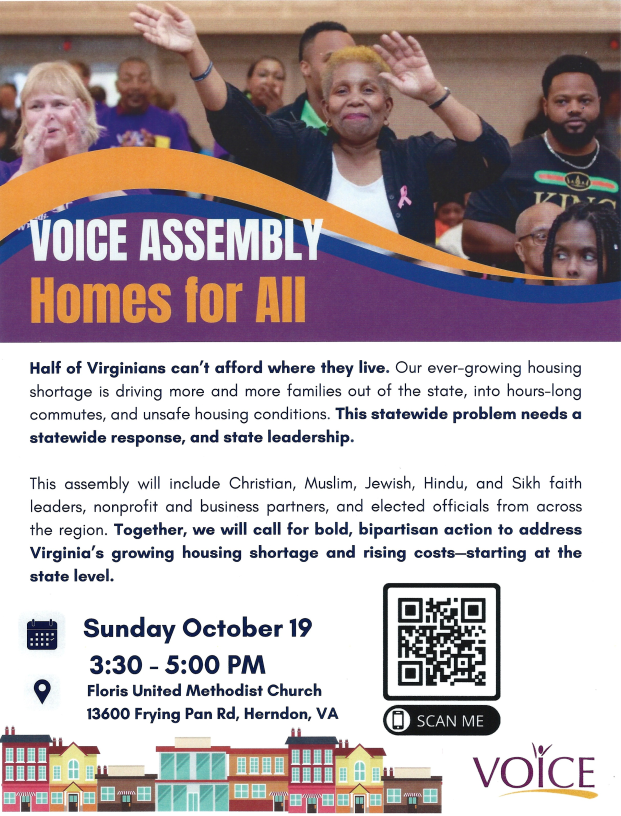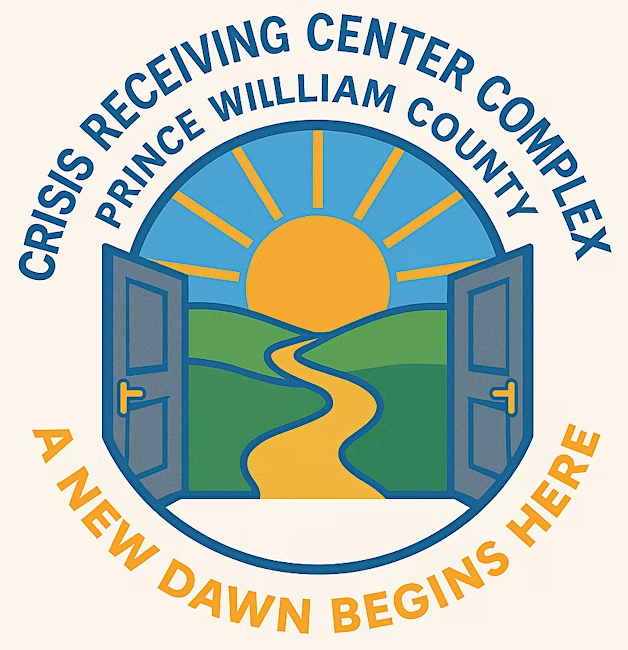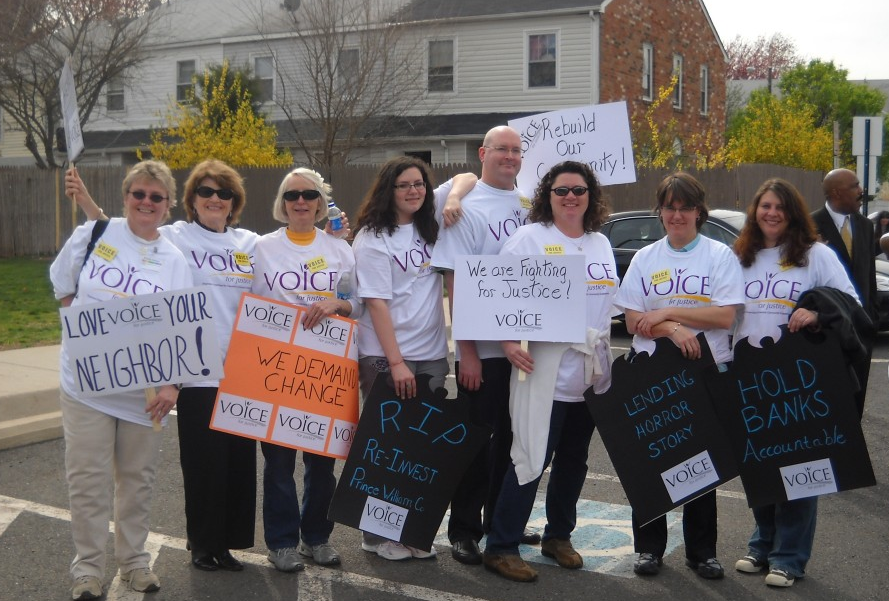VOICE (Virginians Organized for Interfaith and Community Engagement)
Register to tell VOICE you are coming. When you register, you can sign up for a bus lreaving from Manassas Church of the Brethren (10047 Nokesville Road) or First Baptist Church of Manassas (9258 Center Street.)
Carpools from BRUU will assemble starting at 2:15pm and leave at 2:30pm on October 19.
—————————–
BRUU has been an active member of VOICE from its beginning. VOICE is a 501(c)3 non-profit and non-partisan organization. It is led by a diverse team of religious, lay, and community leaders from across Northern Virginia.
This multi-racial, multi-faith organization includes nearly 50 member institutions representing over 125,000 persons. VOICE is designed to “organize people, organize money” to increase social justice. VOICE unites people across lines of race, class, religion, political party and geography to take action on key issues in our community.
Typically, VOICE members focus on three important social justice issues. Choosing them requires careful listening to the priorities of member organizations and finding where there are common threads.
When VOICE started in 2008, there was a nationwide housing foreclosure crisis that was especially critical in Prince William County. By seeking commitments from the three major lenders for mortgage adjustments, VOICE ensured funding for five new, non-profit housing counselors and up to $60 million in adjustments of loans for “underwater” homeowners.
VOICE pressured the lenders who made inappropriate loans to step up and implement solutions – and a Washington Post article shows how VOICE has praised the financial institutions that responded to the challenge. VOICE also shaped the General Assembly decision in 2013 to allocate funding from the Foreclosure Fraud Settlement for “robo-signing” of foreclosure documents.
More recently, BRUU has worked with VOICE to tackle the current shortage of affordable housing. By partnering with other faith institutions, we amplify the impact of our engagement.
After many meetings with Prince William County staff and the 8 elected members on the Board of County Supervisors, VOICE succeeded in getting $5 million/year annually to be included within the county budget and to formally establish the Housing Trust Fund to allocate that funding. More meetings led to adoption of the county’s first Affordable Dwelling Unit ordinance on June 3, 2025 in a 5-3 vote. VOICE advocacy made that decision possible.
The terms of that ordinance were constrained by state law. It created the opportunity for developers to dedicate a higher percentage of new dwelling units as “affordable,” in exchange for zoning approval of a higher number of units per acre. An affordable unit was defined as one that could be purchased/rented by a family spending no more than 30% of its income, if that family earned 80% or less of the Areawide Median Income.
Want more details, or to be part of the solution? Contact the VOICE Core Group at BRUU at voice@bruu.org
—————
Progress in a Forward Direction: The Crisis Receiving Center (CRC)
VOICE organizes people – and elected officials react when they see that a large number of people care about an issue. Governor Youngkin was impressed in 2024 when VOICE gathered 800 people in Triangle to support state funding and authorizations for a Crisis Receiving Center (CRC). He supported the General Assembly approval of $140 million to create nine CRC’s across Virginia.
The CRC is a new approach to addressing mental health and substance abuse patients. Until the CRC opens in 2025, police and emergency services personnel must carry people in need to the emergency room of a local hospital or to a jail. Mental health treatment options in emergency rooms are sparse, since psychiatric care is not very profitable for hospitals.
At the Adult Detention Center (local jail), 70-90% of people suffer from drug, alcohol, gambling addictions or mental health problems. Even the special psychiatric unit in the local jail ends up warehousing people. The CRC is designed to provide quick, focused treatment to people. It is expected to help 4,000-5,000 people per year.
The Prince William Crisis Receiving Center at the former Gander Mountain building at Potomac Mills in Woodbridge will be the first to open in Virginia. It will have 16 beds and 16 recliners for adults, plus 8 beds and 8 recliners for youth 13 and below, starting in August/September.
Recliners are intended for short (23-hour) stays, allowing a person having a mental health episode to stabilize, obtain meds, and be directed towards longer-term care. Beds are for 3-7 day stays. The CRC will be operated by Connections Health Solutions. That company created the CRC model to offer “right care in the right setting at the right time,” and operates a flagship CRC in Tucson, AZ.
After advocacy by VOICE, the Prince William Board of County Supervisors provided over $5 million in interim funding in FY26 budget. That funding was needed until the youth services wing qualifies for Medicaid reimbursement.
The CRC will provide wraparound services using the “no wrong door” model. Prince William County is locating community services offices and opening a pharmacy at the CRC to provide a continuum of care after discharge. The needs of patients will be identified and matched with appropriate services, including permanent supportive shelter such as Good Shepherd Housing. That contrasts with the traditional process, where people are often discharged without any support once they leave the emergency room.
The CRC will have separate entrances for adults, youth, and police so the populations are not mixed.
Police chiefs have been strong supporters of opening the CRC’s. They will allow officers to transfer patients into the CRC care and return to duty within 10 minutes. Currently, police offices are trapped at the hospitals for hours – often in corridors because rooms are not available – until patients are accepted into some form of medical care or discharged.
In 2025, the number of overnight beds available for psychiatric care in Virginia was very limited. There was only one state treatment center for youth located in Staunton, so transportation can consume a lot of overtime hours.
Local police have 40-hour Crisis Intervention Team (CIT) training, including de-escalation techniques, and have successfully talked people out of suicide attempts. Prince William County has six co-responder teams where a therapist from Community Services accompanies police, so situations can be handled by a professional trained to offer mental health services. The co-responder teams are not available 24-7, however.
Outreach efforts by the Health Department and its partners include trying to intercept people who are “frequent flyers” to the emergency room, especially those with addictions. Ideally, providers can get “left of boom” in the timeline and engage in advance of a crisis (“boom”). Prince William County offers training to community groups such as churches, including how to administer Naxalone.
The Prince William chapter of the National Alliance on Mental Illness (NAMI) is an active partner with VOICE and working closely with government agencies and health care providers.
NOTE: People dealing with mental health situations are encouraged to ensure personal safety first, then call 988. If there is a physical threat, call 911. Crisis Intervention services are available 24 hours/day.
 BRUU was active in planning the Youth Behavioral Health Assembly, a VOICE “action” to support full funding for Crisis Receiving Centers, on July 9, 2023. At that gathering, Gov. Youngkin said “Top priority for what we’re going to do over the next two-and-a-half years is to transform our behavioral health system.”
BRUU was active in planning the Youth Behavioral Health Assembly, a VOICE “action” to support full funding for Crisis Receiving Centers, on July 9, 2023. At that gathering, Gov. Youngkin said “Top priority for what we’re going to do over the next two-and-a-half years is to transform our behavioral health system.”




